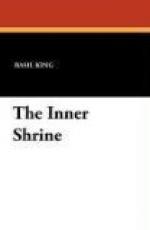The minutes went by, but he sat rigid, with hands clinched before him, and eyes fixed in a kind of hypnotic stare on the cluster of lights, taking no account of time or place. Throughout the house there was the stillness of midnight, broken only by the rumble of a carriage or the clatter of a motor in the street. The silence was the more ghostly owing to the circumstance that throughout the empty rooms lights were still flaring uselessly, welcoming his return. Presently there came a sound—faint, soft, swift, like the rustle of wings, or a weird spirit footfall. Though it was scarcely audible, it was certain that something was astir.
With a start Derek came back from the contemplation of his intolerable pain to the world of common happenings. He must see what could be moving at this unaccustomed hour; but he had barely risen in his place when he was disturbed by still another sound, this time louder and heavier, and characterized by a certain brusque finality. It was the closing of a door; it was the closing of the large, ponderous street-door. Some one had left the house.
In a dozen strides he was out in the hail and on the stairway. There, on the landing, where an hour or two ago he had turned to look down upon Diane, stood Dorothea in her night-dress—a little white figure, scared and trembling.
“Oh, father, Diane has gone away!”
For some seconds he stared at her blankly, like a man who puzzles over something in a strange language. When he spoke, at last, his voice came with a forced harshness, from which the girl shrank back, more terrified than before:
“She was quite right to go. You run back to bed.”
XII
From the shelter of the little French hostelry in University Place, Diane wrote, on the following morning, to Miss Lucilla van Tromp, telling her as briefly and discreetly as possible what had occurred. While withholding names and suppressing the detail which dealt with the manner of her husband’s death, she spoke with her characteristic frankness, stating her case plainly. Though she denied the main charge, she repeated the admissions Derek had found so fatal, and accepted her share of all responsibility.
“Mr. Pruyn is not to blame,” she wrote. “From many points of view he is as much the victim of circumstances as I am. I have to acknowledge myself in fault; and yet, if I were more so, my problem would be easier to solve. There are conditions in which it is scarcely less difficult to discern the false from the true than it is to separate the foul current from the pure, after their streams have run together; and I cannot reproach Mr. Pruyn if, looking only on the mingled tides, he does not see that they flow from dissimilar sources. Though I left his house abruptly, it was not because he drove me forth; it was rather because I feel that, until I have regained some measure of his respect, I cannot be worthy in his eyes—nor in my own—to be under one roof with his daughter.”




